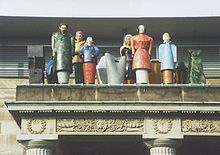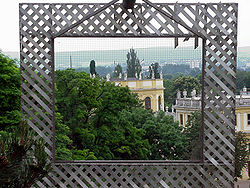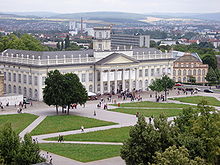- documenta
-
documenta is an exhibition of modern and contemporary art which takes place every five years in Kassel, Germany. It was founded by artist, teacher and curator Arnold Bode in 1955 as part of the Bundesgartenschau (Federal Horticultural Show) which took place in Kassel at that time. This first documenta featured many artists who are generally considered to have had a significant influence on modern art (such as Picasso and Kandinsky). The more recent documentas feature art from all continents; nonetheless most of it is site-specific. The last documenta, the documenta XII, was from 16th of June until 23rd of September 2007. Every documenta is limited to 100 days of exhibition, which is why it is often referred to as the “museum of 100 days”.[1] The documenta XIII will begin on June 9th, 2012. It often coincides with three other major art world events: the Venice Biennale, Art Basel and Skulptur Projekte Münster.
… Again and again, the documenta has shattered the world of art, whether in poor postwar times when people thirsted for art, whether in rebellious years of revolution, whether in the lighthearted era at the end of the 20th century or whether at the turn of the century dominated by globalisation. The history of the documenta is a history of defeats, of doubts, of scandals and, at the same time, of renewal, of discovery and of artistic creatitvity. Above all, however, it has always been a history of success …—Michael Glasmeier and Karin Stengel [2]Contents
Etymology of “documenta”
The name of the exhibition is an invented word. The term is supposed to demonstrate the intention of every exhibition (in particular of the first documenta in 1955) to be a documentation of modern art which was not available for the German public during the Nazi era. Rumour spread from those close Arnold Bode that it was relevant for the coinage of the term that the Latin word “documentum” could be separated into “docere” (Latin: “teach”) and “mens” (Latin: “intellect”) and therefore thought it to be a good word to describe the intention and the demand of the documenta.[3]
History
 „Stadtverwaldung“ by Joseph Beuys, Oaktree in front of the museum Fridericianum, documenta VII
„Stadtverwaldung“ by Joseph Beuys, Oaktree in front of the museum Fridericianum, documenta VII
 A documenta work of art on the balcony of the former "Rotes Palais": Die Fremden by Thomas Schütte, documenta IX 1992
A documenta work of art on the balcony of the former "Rotes Palais": Die Fremden by Thomas Schütte, documenta IX 1992
Initiator of documenta 1, the first documenta, was art professor and designer Arnold Bode from Kassel. Originally planned as a secondary event to accompany the Bundesgartenschau, he achieved to attract more than 130,000 visitors in 1955. The first exhibition centred less on „contemporary art“, that is art after 1945, instead, Bode rather wanted to show the public the works of those artists which had been known as „Entartete Kunst“ in Germany during the Nazi era: Fauvism, Expressionism, Cubism, Blauer Reiter, Futurism and Pittura Metafisica. Therefore, abstract art, in particular the abstract paintings of the 1920s and 1930s were the focus of interest in this exhibition. In the course of the years the focus shifted to contemporary art. At first, the show was limited on works from Europe, but it soon covered works of artists from America, Africa and Asia. Adopting the theme of Questioning Reality -- Pictorial Worlds Today,, the 1972 documenta radically redefined what could be considered art by featuring minimal and conceptual art, marking a turning point in the public acceptance of those styles.[4] Documenta XI was organized around themes like migration, urbanization and the post-colonial experience.[5]
Directors
The first four documentas, organized by Arnold Bode, established the exhibition's international credentials. Documenta 8 was put together in two years instead of the usual five. The original directors, Edy de Wilde and Harald Szeemann, were unable to get along and stepped down. They were replaced by Manfred Schneckenburger, Edward F. Fry, Wulf Herzogenrath, Armin Zweite, and Vittorio Fagone.[6] documenta IX's team of curators consisted of Jan Hoet, Piero Luigi Tazzi, Denys Zacharopoulos, and Bart de Baere.[7] For documenta X Catherine David was chosen as the first woman and the first non-German speaker to hold the post.
Title Date Director Exhibitors Exhibits Visitors documenta 16 July - 18 September, 1955 Arnold Bode 148 670 130,000 documenta II 11 July - 11 October, 1959 Arnold Bode, Werner Haftmann 338 1770 134,000 documenta III 27 June - 5 October, 1964 Arnold Bode, Werner Haftmann 361 1450 200,000 documenta IV 27 June - 6 October, 1968 24-strong documenta council 151 1000 220,000 documenta V 30 June - October, 1972 Harald Szeemann 218 820 228,621 documenta VI 24 June - 2 October, 1977 Manfred Schneckenburger 622 2700 343,410 documenta VII 19 June - 28 September, 1982 Rudi Fuchs 182 1000 378,691 documenta VIII 12 June - 20 September, 1987 Manfred Schneckenburger 150 600 474,417 documenta IX 12 June - 20 September, 1992 Jan Hoet 189 1000 603,456 documenta X 21 June - 28 September, 1997 Catherine David 120 700 628,776 documenta XI 8 June - 15 September, 2002 Okwui Enwezor 118 450 650,924 documenta XII 16 June - 23 September, 2007 Roger M. Buergel 114 over 500 754,301 documenta XIII 9 June - 16 September, 2012 Carolyn Christov-Bakargiev Venues
documenta is held in different venues in Kassel. Since 1955, the fixed venue has been the Fridericianum. The documenta-Halle was built in 1992 for documenta IX and now houses some of the exhibitions. Other venues used for documenta have included the Schloss Wilhelmshöhe and the Neue Galerie. Though Okwui Enezor notably tried to subvert the euro-centric approach documenta had taken, he instigated a series of 5 platforms before the documenta XI in Vienna, Berlin, New Dehli, St Lucia and Lagos; in an attempt to take documenta into a new post-colonial, borderless space, from which experimental cultures could emerge.
There are also a number of works that are usually presented outside, most notably in Friedrichsplatz, in front of the Fridericianum, and the Karlsaue park. For documenta XII, French architects Anne Lacaton and Jean-Philippe Vassal constructed the temporary "Aue-Pavillon" in the park.
 View of the Friedrichsplatz with the Fridericianum (2nd Building from the left) and the documenta ticket booth (right)
View of the Friedrichsplatz with the Fridericianum (2nd Building from the left) and the documenta ticket booth (right)
Visitors
The 2002 edition of Documenta attracted 650,000 visitors.[8]
See also
References
- ^ Arnold Bode coined this phrase for the first time in the prologue of the first volume of the catalogue: documenta III. Internationale Ausstellung; Catalogue: Volume 1: Painting and Sculpture; Volume 2: Sketches; Volume 3: Industrial Design, Print; Kassel/Köln 1964; S. XIX
- ^ Glasmeier, Michael; Stengel, Karin: documenta Archäologie, in: 50 Jahre/Years documenta 1955–2005; 2 volumes: Diskrete Energien/archive in motion; Kassel 2005, p. 9 ISBN 3-86521-146-1
- ^ Kimpel, Harald: documenta, Mythos und Wirklichkeit. Köln 1997, ISBN 3-7701-4182-2
- ^ Helen Chang (June 22, 2007), Catching the Next Wave In Art at Documenta Wall Street Journal.
- ^ Stephan Valentin (June 12, 2007), An art show in Kassel, Germany, rivals Venice Biennale New York Times.
- ^ Michael Brenson (June 15, 1987), 'Documenta 8,' Exhibition In West Germany New York Times.
- ^ Michael Kimmelman (July 05, 1992) At Documenta, It's Survival Of the Loudest New York Times.
- ^ Adrian Searle (June 19, 2007), 100 days of ineptitude The Guardian.
External links
- http://www.documenta.de -- official web page of the documenta
- documentaX -- official archive of the documenta X (1997), first to include the internet
- City Panorama Interactive Panorama at the Documenta Hall
- [1] archive of documenta X
- Documenta 2007
- [2] archive of documenta artists
- Article of the Goethe-Institut on documenta 12
- Article of the Goethe-Institut on the history of the documenta
Further reading
- Nancy Marmer, "Documenta 8: The Social Dimension?" Art in America, Vol. 75, September 1987, pp. 128-138, 197-199.
Categories:- Articles in translation
- Contemporary art exhibitions
- Visitor attractions in Hesse
- Art exhibitions
- Kassel
Wikimedia Foundation. 2010.


